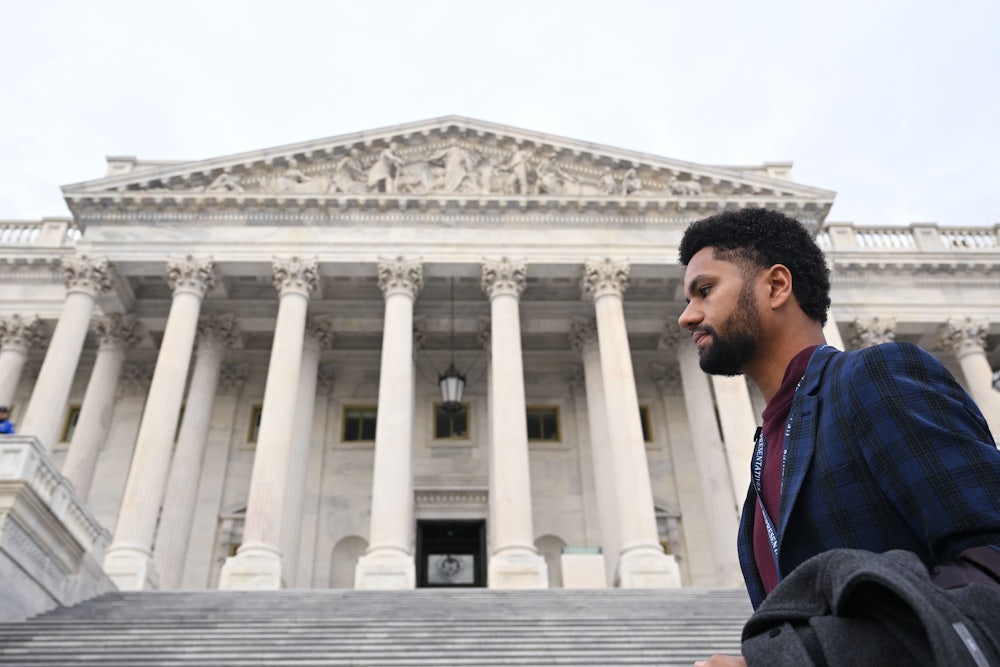Maxwell Frost was houseless for a month during his winning campaign to represent Florida’s 10th congressional district in Congress.
“I got priced out of my home here in Orlando,” Frost, a 25-year-old Democrat, said in an interview with The New Republic. The first congressman-elect of Generation Z, he talked about being a renter, representing central Florida, and jump-starting the arts in Congress. “I was getting denied at places right and left because I didn’t have a job,” recalled Frost. “I was an unemployed full-time candidate [and] Uber driver who was not making enough to afford the places me, my sister, and my girlfriend were looking to live.”
The freshman-elect’s housing challenges have followed him to the Beltway, where he tweeted this month about losing his application fee after being denied an apartment. “My credit’s always been great, actually,” Frost said. “I’ve been blessed to be full time in campaign space since I was 18 years old, and had a great job before I quit to run for office.”
The Federal Election Commission prohibits congressional candidates from spending campaign funds for personal use, though they can pay themselves a salary after filing for their party’s primary. Frost drove Uber at night to make ends meet, a challenge he said is unique to candidates from poor backgrounds.
Gen Z was born between the late 1990s and early 2010s. They are digital natives, the first generation born into a world connected by the internet. In the United States, Gen Z’s first decades have been marked by school shootings, economic downturns, and a global pandemic.
“My generation already is going to own the least amount of assets of any generation if the trends continue. On top of that, now we’ve been pushed into the renters’ world, and now it’s becoming harder and harder to even rent,” said Frost, who will earn a $174,000 annual salary as a House member when the new Congress begins on January 3.
“I was denied within an hour and a half,” he continued about his rejected apartment application in D.C. “There wasn’t a human that looked at my application. My numbers were run through a machine, and the machine said ‘denied,’ and when I called the leasing office … they say there’s nothing they can do even though I’m about to be in Congress.”
In Orlando, Frost rents from a local landlord. “I was able to sit down with the person and talk with her and suss it out,” he said about finding housing on the campaign trail. “We blew through hundreds of dollars of application fees on these bigger companies that are not even based in Orlando. A lot of these companies view application fees as a revenue source.… That should be illegal.”
Frost said housing and transportation are his constituency’s top priorities. “We have the worst housing crisis per capita in the country right now here in Central Florida,” he said. “Our average commute time is going through the roof. We need more affordable housing near our city centers. That way people can move and be near opportunities.”
Frost replaces retiring Democratic Representative Val Demings, who lost her senatorial race to Republican incumbent Marco Rubio. Spanish is Frost’s first language. He was born to a Puerto Rican mother of Lebanese descent and a Haitian father but was adopted at birth by a Cuban-American mother and white father from Kansas.
“We speak Spanglish in the house, and I know that’s the same for a lot of Latino families in the district,” Frost told The Hill’s Rafael Bernal last month. “My abuela taught me early on to always look out for my community,” said Frost in a bilingual campaign ad during the primary.
Demings described Frost as “older than his years,” in a hallway interview last week at the Capitol. “He’s coming into a place that he’s never been before, but he has the skills and ability to do well here,” she said.
“I have told him to remember that everybody around him wants something,” Demings added. “That’s not necessarily a bad thing. He has the knowledge, but wisdom and experience will help him navigate the sometimes treacherous waters here. And wisdom and experience only comes with time. So he needs to listen and he’ll be fine.”
Frost listens to the world with musician’s ears. In middle school, he formed a salsa band with his friends. During his sophomore year of high school at the Osceola County School for the Arts, Frost fundraised to perform in the parade at Barack Obama’s second inauguration in D.C.
“It was Max Frost’s idea,” high school counselor Donna Hart said in a 2013 interview about the effort to raise money to cover the trip’s expenses and solicit a letter of recommendation from then-Senator Bill Nelson.
Frost told NPR he wanted his salsa band, Seguro Que Si, to represent the Latinos at the inauguration because it was Latino voters who had elected Obama in Florida. Local news coverage of the January parade shows Frost at the drums, surrounded by his bandmates, goading the president and first lady Michele Obama to their feet with his drumstick as their float drives by the inaugural grandstand.
“We made Obama dance salsa,” laughed Frost, recalling the performance. “I used to joke that I peaked in high school, but that joke doesn’t work anymore now that I’m going to Congress.”
Campaigning to perform at Obama’s inauguration was formative for Frost. “It was really there that the combination of arts, policy, politics, and movement work started coming together,” he said.
After high school, Frost joined the March for Our Lives campaign as a full-time organizer advocating for gun safety laws. Stopping school shootings is the top policy priority for Frost’s generation, according to a July report by the Walton Family Foundation.
Frost met his girlfriend, Jamie, a fellow March for Our Lives organizer, on the campaign trail for gun reform. “We’re both artists at heart,” said Frost. “She comes from more of the film world. I come from more of the music world.”
After nearly four years together, watching films is how the couple spends many of their date nights. Frost’s favorite lately is Nightmare Alley—a film by director Guillermo del Toro, starring Cate Blanchett and Bradley Cooper, about a Victorian con man with a mind-reading hustle.
Art policy is an area where Frost sees strong bipartisan potential in Congress. “I would like to see if we can get the Congressional Arts Caucus started back up,” he said.
Co-chaired by Democrat Chellie Pingree and Republican Elise Stefanik, the 138-member arts caucus interfaces with nongovernmental foundations like the National Endowment of the Arts to promote educational initiatives and fund the arts through grants to museums and other venues.
“The people who are left out in the conversation on the Hill are the over five million people who work in the arts industry, independently, and the countless artists who spend money out of their own pocket to attempt to be a part of this world,” said Frost, who believes fighting for direct support for artists themselves is a racial and economic justice issue.
“If you look at Black and brown artists, they spent a lot more of their personal wealth to get to where they are,” he said. FACTOR is a Toronto-based public-private partnership focused on developing Canada’s music industry that Frost said Congress could emulate stateside. “A lot of these artists end up blowing up, like the Weeknd and Daniel Caesar—so I think it can get bipartisan support.”
Back in Orlando, Frost finds beauty in the staple of his district’s tourism economy. “I think that theme parks are an art form,” said Frost, whose district includes Disney World, SeaWorld, and Universal. “I’m really into live events and live experiences.”
Frost won’t say which Orlando theme park is his favorite. “I don’t want to get in hot water here, so let me just say all of the theme parks in central Florida are great,” said Frost, before quickly adding: “I will say that I do have a pass to Universal Studios just because I’m kind of a thrill seeker, and we do have one of the top five roller coasters in the world here in Orlando in the VelociCoaster, and we also have the very best family coaster in the world, called Hagrid’s, where you actually get to ride a motorcycle with [Harry Potter’s companion] Hagrid through the Forbidden Forest.”
Frost bristles at the notion that, as his generation’s vanguard in Congress, he is somehow the sole leader of Gen Z. “I’m looking at … being the first of anything in an institution like Congress is, number one, worth celebrating,” he said. “But there’s an inherent added responsibility of working to bridge the gap between cool and consciousness to really build a movement that we need across the country—not just in the halls of Congress.”






